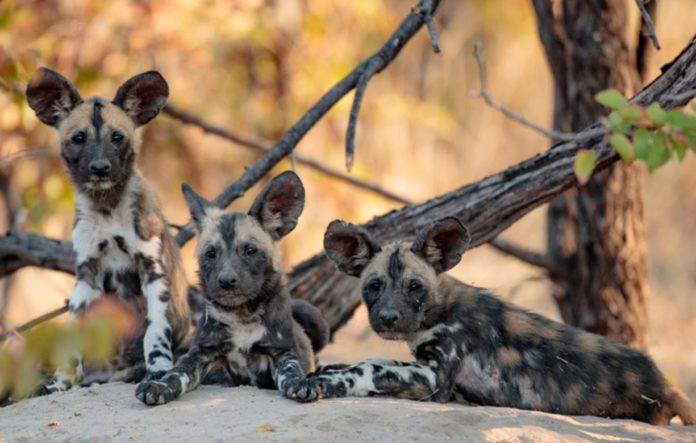Changes in climate are causing dramatic shifts in the timing of important life events for many species. Some flowers bloom early, for instance, with a spring thaw that occurs earlier. But it’s unclear to scientists if these large alterations to a species’ life history would eventually help it survive or cause more issues.
For the first time, it is demonstrated in a study that was released today in the Proceedings of the National Academy of Sciences that a species of large carnivore has significantly altered its life history in reaction to a changing environment, and may now be worse off as a result.
An NGO in the area, Botswana Predator Conservation, and a team of University of Washington researchers examined field observations and demographic data for populations of the African wild dog, Lycaon pictus, from 1989 to 2020. They found that over a period of 30 years, the animals moved their average birth dates back by 22 days. This change allowed them to have their babies when the weather was coolest, in early winter. However, due of this dramatic change, fewer pups survived their most vulnerable period since temperatures during their critical post-birth “denning period” increased over the same time period, posing a threat to the population of an already endangered species.
The study’s lead author, Briana Abrahms, an assistant professor of biology at the University of Washington and a researcher with the Center for Ecosystem Sentinels, claims that it demonstrates how African wild dogs, which are distantly related to wolves and raise pups in packs cooperatively, may fall victim to a “phenological trap.” When a species falls victim to a phenological trap, it alters the timing of a crucial life event in response to an environmental cue, but the adjustment turns out to be maladaptive because of previously unheard-of environmental conditions like climate change.
“It is an unfortunate ‘out of the frying pan, into the fire’ situation,” Abrahms said. “African wild dogs shifted birthing dates later in order to keep pace with optimal cool temperatures, but this led to hotter temperatures during the denning period once those pups were born, which ultimately lowered survival.”
The study clarifies a point that scientists had been unsure of: species on high “trophic levels” in ecosystems, such as huge predators, can be just as sensitive to climate change as other species. Other studies have demonstrated that long-term warming can cause phenological shifts, or changes in the timing of significant life events, in “primary producer” species, such as plants, and “primary consumers,” which include many birds and insects that eat plants. However, up until this point, a large mammalian carnivore’s phenological shift has never been linked to the climate. Even though predators are “far removed” up the food chain, Abrahms and her colleagues demonstrate that huge predators can nevertheless exhibit robust responses to long-term climate change. Their findings were published in the journal Science.
For their investigation, the team examined information gathered over a period of more than three decades by them and their collaborators on 60 packs of African wild dogs that roam a more than 1,000 square mile area of northern Botswana. This species reproduces once a year in the winter. Puppies spend roughly three months with their mother at the den after they are born before starting to travel and hunt with the pack.
Abrahms and her colleagues found that over the 30-year study period, adults gradually postponed breeding by roughly one week per decade by analyzing the dates that mothers of African wild dogs gave birth to their litters each year.
According to Jeremy Cohen, a researcher at Yale University and the Center for Biodiversity and Global Change who was not involved in the study, “Although most animal species are advancing their life history events earlier in the year with climate change, this finding represents a rare instance of a species delaying its life history, and at a rate twice as high as the average rate of change observed across animal species.”
According to Abrahms, such a significant shift is probably caused by the area’s quick rate of warming and the fact that African wild dogs have evolved to reproduce inside a constrained “thermal window.”
The number of pups that made it through the dening phase each year was determined using long-term demographic data. They found a link between denning period temperatures and survival: Warmer denning periods were associated with a decrease in pup enrollment to packs towards the end of winter, which suggested that fewer pups had survived the denning period.
Over the course of the study period, daily maximum temperatures increased on average by roughly 1.6 degrees Celsius (2.9 degrees Fahrenheit). Annual maximum temperatures increased by 3.8 degrees Celsius—just over 6 degrees Fahrenheit—during the same time period.
Without the decades of meticulous field research conducted by Botswana Predator Conservation, the team would not have reached its unexpected conclusions, according to Abrahms.
“We could only conduct this study because of the existence of this unique, long-term dataset for a large predator, which is really rare,” Abrahms added. “It shows the value for this kind of data in studying how climate change will impact ecosystems.”
African wild dogs, which have the biggest continuous habitat, are in danger due to habitat loss and fragmentation, illness, and human-human conflict in the study area in northern Botswana. Only 1,400 mature individuals are thought to remain in the wild, according to the International Union for Conservation of Nature.
Large predators are crucial to ecosystem health, but there is still much we don’t know about how climate change may affect them, according to Abrahms. “Big climate-driven shifts like the one we found may be more widespread in top predators than originally thought, so we hope our findings will spur new climate-change research on other predator populations around the planet,” the author said.
Image Credit: BOBBY-JO VIAL
You were reading: Adapting To Climate Change Could Be A Phenological Trap – Scientists Show For The First Time
